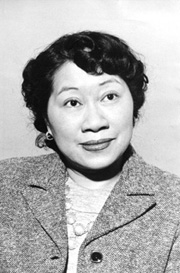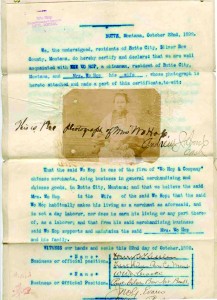
Born in Butte in 1904, Rose Hum Lee earned a B.S. in social work from Pittsburgh’s Carnegie Institute of Technology and completed a doctorate in sociology at the University of Chicago. Her dissertation—The Growth and Decline of Rocky Mountain Chinatowns—was published in 1978. Because her work was largely based on the experiences of her own family and childhood, her scholarship offers invaluable insights into the lives of Chinese women and families in Butte during the first four decades of the twentieth century.
The daughter of merchant Hum Wah Long and his wife, Lin Fong, Rose Hum Lee, like other Butte-born Chinese American children, attended Butte’s grammar and high schools, where she distinguished herself academically. Additionally, the fact that her father was one of the city’s most prominent Chinese businessmen conferred a level of respect on the Hum family.
Nevertheless, Lee, like other Chinese women of Butte, encountered the common racist assumption that equated Chinese women with prostitution. The Montana Standard reflected that stereotype while defending the wives of Butte’s merchants in a 1942 article about the city’s Chinese history. “While the Chinese men of Butte were, as a rule, good law-abiding citizens . . . the less said about the Chinese women of that day the better,” the Standard noted. “The exception among the women were the wives of Chinese doctors and merchants, women who were on the level with their white sisters and who have left many estimable children.” Certainly, those estimable children—like Lee—contended with pressure to maintain their respectability. Continue reading “Women . . . on the Level with Their White Sisters”: Rose Hum Lee and Butte’s Chinese Women in the Early Twentieth Century
